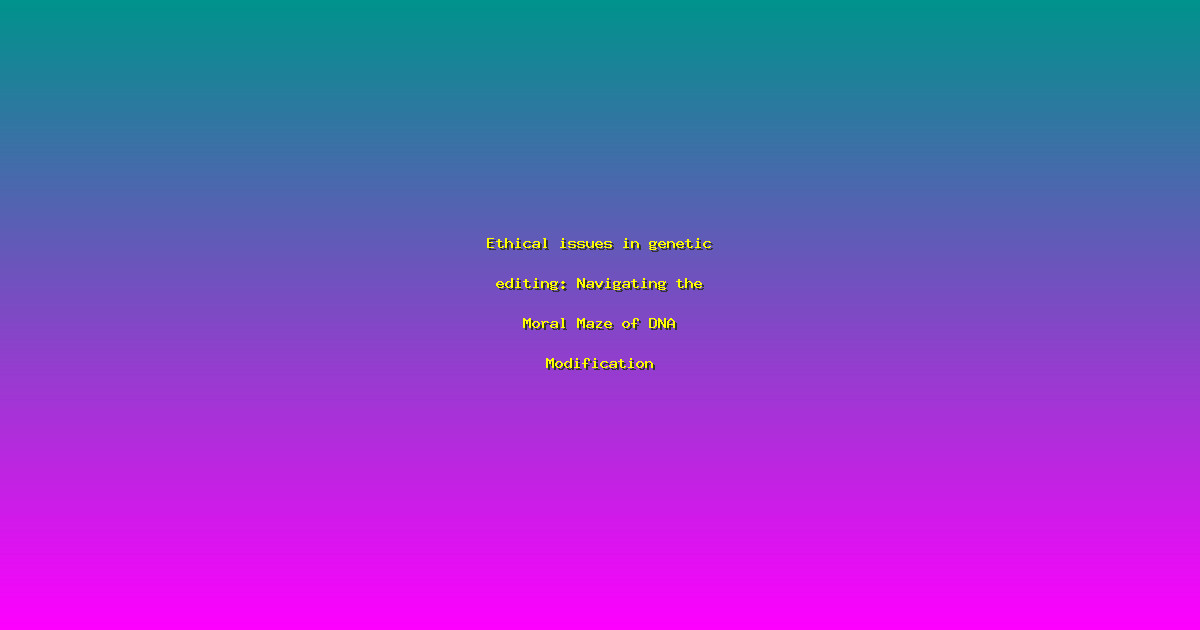Ethical Issues in Genetic Editing: Navigating the Moral Maze of DNA Modification
As technology advances, the ability to edit genetic material has transformed from science fiction into a reality. Genetic editing, particularly through techniques like CRISPR, holds the potential to cure genetic diseases, enhance human traits, and even eradicate certain illnesses from the population. However, this remarkable power also raises significant ethical concerns that society must address. This article delves into the moral maze of genetic editing, exploring the implications for individuals, future generations, and the environment.
The Promise and Peril of Genetic Editing
Genetic editing promises to correct genetic defects and potentially eliminate hereditary diseases. Yet, the practice also raises concerns about the creation of ‘designer babies,' where parents could choose traits like eye color, intelligence, and athleticism. This could exacerbate social inequalities, fostering a society where the rich have access to enhancements while the poor do not. Moreover, the long-term effects of genetic modifications on human health and ecosystems remain largely unknown, posing risks that could be irreversible.
Ethical Considerations
One of the primary ethical considerations is the potential for misuse, including the possibility of creating genetic weapons or the enhancement of traits for non-medical purposes. Additionally, the introduction of genetically modified organisms into the environment could disrupt ecosystems, leading to unforeseen consequences. Ensuring informed consent is also crucial, especially in cases involving embryos where consent is not possible. These issues necessitate a robust regulatory framework that balances innovation with ethical responsibility.
Regulatory Challenges and Ethical Guidelines
Developing effective regulations and ethical guidelines is challenging due to the rapid pace of technological advancement and the global nature of scientific research. International cooperation is essential to establish norms that prevent unethical practices while promoting beneficial research. Ethical guidelines must be adaptable to accommodate new discoveries while upholding the dignity and rights of all individuals.
Public Engagement and Awareness
Engaging the public in discussions about genetic editing is vital. Transparent communication about the benefits, risks, and ethical implications will help shape public opinion and influence policy. Public involvement can also ensure that the development of genetic editing technologies aligns with societal values and expectations.
Frequently Asked Questions
- What is CRISPR?
- CRISPR (Clustered Regularly Interspaced Short Palindromic Repeats) is a revolutionary gene-editing technology that allows scientists to edit parts of the genome by adding, removing, or altering sections of the DNA sequence.
- Can genetic editing be used to enhance human abilities?
- Yes, genetic editing has the potential to enhance human abilities, raising ethical concerns about fairness and the natural diversity of human traits.
- What are the risks associated with genetic editing?
- Risks include the creation of unforeseen genetic mutations, the potential for misuse, and the long-term ecological impact of genetically modified organisms.
- How are countries addressing the ethical issues of genetic editing?
- Many countries have established regulatory bodies to oversee genetic research and editing, emphasizing the need for ethical guidelines and public oversight.
- Is genetic editing legal in all countries?
- The legality of genetic editing varies by country. Some countries have strict regulations or outright bans, while others allow research under specific conditions.
- What is the future of genetic editing?
- The future of genetic editing depends on ongoing research, ethical considerations, and public policy. As technology advances, so must our understanding of its ethical implications.
Conclusion and Call to Action
The field of genetic editing is at a critical juncture, requiring careful ethical navigation to ensure that its potential benefits are realized without compromising our moral principles. It is imperative for stakeholders, including scientists, policymakers, and the public, to engage in ongoing dialogue and establish balanced guidelines that respect human dignity and environmental stewardship.
To learn more about the ethical issues surrounding genetic editing and to contribute to the conversation, visit your local library or search for educational resources online. Your voice can help shape a future where genetic editing serves the greater good without compromising ethical standards.

